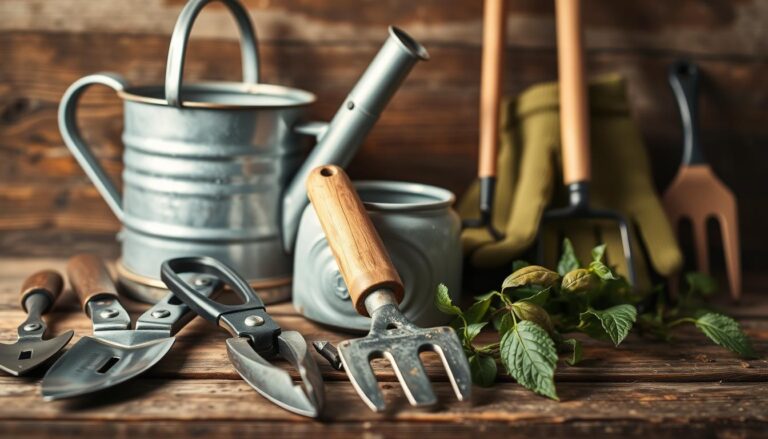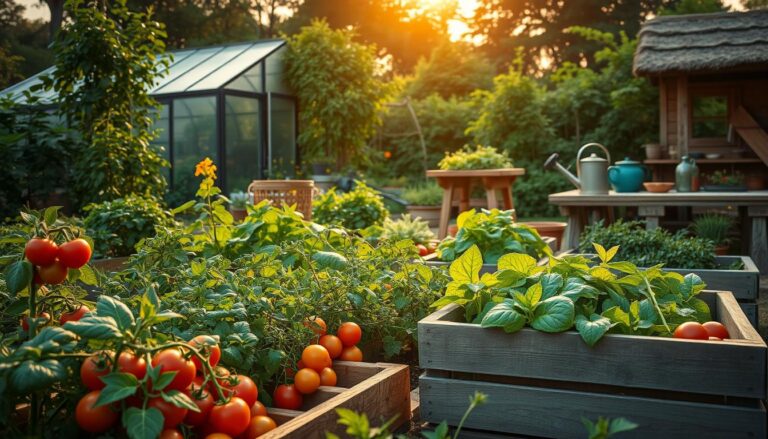Starting your organic gardening journey is both exciting and overwhelming. With many gardening options out there, it’s crucial to start with the basics.
Having the right tools makes gardening more fun and increases your chances of success. As a beginner, knowing the must-have tools is key to a thriving garden.
Whether you want to grow veggies, fruits, or flowers, the right gardening equipment is essential. In this guide, we’ll cover the basic tools for organic gardening. This will help you start your sustainable gardening journey.
Understanding Organic Gardening Principles
Organic gardening is more than a method; it’s a way of life. It aims to create a balanced ecosystem that’s good for both the gardener and the planet.
The Philosophy Behind Organic Gardening
The heart of organic gardening is respect for nature. It uses natural methods and materials, avoiding harmful chemicals. This way, plants grow healthier and the environment benefits too. Key principles include biodiversity, soil conservation, and efficient resource use.
By following these principles, gardeners can make their gardens thrive with less outside help. For example, composting improves soil health and supports many microorganisms.
Benefits of Going Organic in Your Garden
Switching to organic gardening has many perks. One big plus is better soil health. Organic methods like composting and crop rotation make soil richer and more fertile. This leads to healthier plants.
Organic gardening also boosts biodiversity by welcoming beneficial insects and wildlife. Some main benefits are:
- Healthier produce, free from chemical residues
- Improved soil health and fertility
- Increased biodiversity in the garden
- Reduced environmental impact through sustainable practices
As gardening expert, Masanobu Fukuoka, once said, “The ultimate goal of farming is not the growing of crops, but the cultivation and perfection of human beings.” This quote shows how organic gardening improves both the garden and the gardener.
Essential Tools for Organic Gardening: The Basics
Starting organic gardening means choosing the right tools first. It’s not just about avoiding harmful chemicals. It’s also about using the best equipment to care for your garden.
The right tools can greatly improve your garden’s health and yield. They help save time, work more efficiently, and protect the environment.
Quality vs. Cost: Investing in the Right Tools
The debate on gardening tools often focuses on quality versus price. Cheaper tools might seem appealing, but investing in durable ones saves money over time. High-quality tools last longer, need less upkeep, and work better under various conditions.
A durable garden fork can last decades with proper care. But a cheaper one might need to be replaced in a few years. Alan Chadwick, a gardening expert, says, “A good tool is not just a tool; it’s an extension of the gardener.”
| Tool | Low-Cost Option | High-Quality Option |
|---|---|---|
| Garden Fork | $10-$20 | $30-$50 |
| Garden Hoe | $5-$15 | $20-$40 |
Sustainable Materials to Look For
Sustainability is key in organic gardening. Choose tools made from eco-friendly materials. Handles made from bamboo or sustainably sourced wood are best. Metal parts should be recycled whenever possible.
Sustainable Materials:
- Bamboo
- Sustainably sourced wood
- Recycled metal
As
“Gardening is not just about growing plants; it’s about creating a sustainable ecosystem.”
This mindset helps pick tools that do their job well and help the garden stay sustainable.
Caring for Your Garden Tools
Keeping garden tools in good shape is essential. Clean, dry, and store them properly to avoid rust and damage. Sharpening tools regularly also boosts their performance.
Tool Maintenance Tips:
- Clean tools after each use.
- Dry tools to prevent rust.
- Store tools in a dry, protected area.
- Sharpen cutting tools regularly.
Soil Preparation Tools
The foundation of a thriving organic garden is its soil. Preparing it right is key. It involves loosening, aerating, and enriching the soil for plant growth. Using eco-friendly gardening tools helps the garden and the environment.
Garden Spades and Forks
Garden spades and forks are essential organic gardening equipment. A spade digs and turns over soil. A fork loosens and aerates it gently. Choose wisely based on your soil type; forks are better for clay soils.
Broadforks and Tillers for Larger Areas
For big gardens, broadforks and tillers are key. Broadforks loosen soil without turning it, keeping the ecosystem intact. Tillers, manual or powered, break up and aerate soil well. They’re crucial for large plots.
Soil Testing Kits and pH Meters
Knowing your soil’s pH and nutrient levels is vital. Soil testing kits and pH meters are must-haves. They show soil’s acidity, alkalinity, and nutrient needs, guiding your fertilizer choices.
Wheelbarrows and Garden Carts
Wheelbarrows and garden carts are handy eco-friendly gardening tools. They help move soil, compost, and plants. They save manual labor and boost efficiency. Choose based on garden size and tool material for durability.
With these tools, you’re set to create a fertile organic garden. Soil quality affects garden health and productivity. Investing in the right tools is a smart move.
Hand Tools for Planting and Weeding
For any gardener, the key to a thriving organic garden lies in the effective use of hand tools for planting and weeding. These tools not only make the gardening process more efficient but also reduce the physical strain associated with manual gardening tasks.
Trowels and Dibbers
Trowels and dibbers are essential tools for organic gardening, used for planting seeds, seedlings, and bulbs. A trowel is a versatile tool that can be used for digging small holes, transplanting plants, and mixing soil. Dibbers, on the other hand, are used to create holes for seeds or seedlings, ensuring they are planted at the correct depth.
Hand Cultivators and Weeders
Hand cultivators and weeders are must-have tools for organic gardening, designed to loosen soil and remove weeds without causing damage to the surrounding plants. These tools come in various shapes and sizes, each serving a specific purpose in maintaining soil health and controlling weed growth.
Hoes and Hand Rakes
Hoes and hand rakes are crucial for weeding and soil preparation. A hoe is used to chop weeds and cultivate the soil surface, while a hand rake is used to even out soil, remove debris, and prepare the soil for planting.
Seed Spreaders and Bulb Planters
Seed spreaders and bulb planters simplify the process of sowing seeds and planting bulbs. Seed spreaders ensure even distribution of seeds across the garden bed, while bulb planters make it easy to plant bulbs at the correct depth and spacing.
By incorporating these hand tools into your gardening routine, you can significantly improve the health and productivity of your organic garden. Whether you’re a seasoned gardener or just starting out, having the right tools is essential for achieving success in organic gardening.
Watering Equipment for Organic Gardens
The right watering equipment is key for organic gardening. It makes sure plants get the right water without wasting it.
Watering well is vital for a healthy organic garden. There are many options. Gardeners can pick the best sustainable gardening tools for them.
Watering Cans and Hoses
Watering cans and hoses are basic but crucial tools. Look for a durable watering can with a comfy handle. Choose hoses made from eco-friendly materials that don’t kink or leak.
Drip Irrigation Systems
Drip irrigation systems are very efficient. They water plants right at the roots, cutting down on evaporation and runoff. They’re great for big gardens or saving water.
Rain Barrels and Water Conservation Tools
Collecting rainwater is a smart way to save water. Rain barrels catch rainwater from downspouts. This water can then water your plants.
Moisture Meters and Timers
Moisture meters help check soil moisture. Watering timers automate watering, making it consistent and efficient.
Using these eco-friendly gardening tools makes your organic garden more sustainable and healthy.
Pruning and Maintenance Tools
To keep your organic garden thriving, you need the right tools. Pruning is key for healthy growth and fruiting. It also removes diseased or damaged plant parts.
Pruning Shears and Loppers
Pruning shears are essential for cutting small branches and stems. Loppers handle thicker branches that shears can’t. Choose high-quality, sharp, and durable tools for easier pruning.
- Look for pruning shears with comfortable grips and easy use.
- Choose loppers with long handles for extra leverage.
Garden Scissors and Knives
Garden scissors and knives are great for many tasks. They’re used for cutting twine, harvesting, and making precise cuts. High-carbon stainless steel tools are durable and resistant to corrosion.
- Garden scissors are perfect for delicate tasks.
- Garden knives are useful for grafting and cutting thicker stems.
Saws and Hedge Trimmers
Saws and hedge trimmers are vital for big pruning tasks. There are hand saws, pole saws, and different hedge trimmer types. Choose based on your garden size and preference.
- Select saws for the cuts and branch sizes you need.
- Hedge trimmers come in various sizes and power sources.
Tool Sharpeners and Maintenance Kits
Sharp and well-maintained tools are crucial. Tool sharpeners and maintenance kits help keep them in top shape. Regular maintenance boosts tool performance and safety.
Include sharpening stones, files, and lubricants in your routine. They keep your tools sharp and safe.
Ergonomic Tools and Gardening Safety
Gardening is a fulfilling activity that brings fresh produce and relaxation. It can be physically demanding and lead to injuries without proper precautions. Using ergonomic tools and safe practices can reduce strain and injury risks.
Ergonomic Tool Designs for Reduced Strain
Ergonomic gardening tools are made to reduce strain and discomfort. They have handles that fit comfortably in your hand, easing grip pressure. For instance, ergonomic handles on trowels and pruners can make a big difference.
Protective Gear for Organic Gardeners
Protective gear is key to avoiding injuries. It includes gardening gloves for hand protection, safety glasses for eye safety, and knee pads for knee cushioning.
Tools for Gardeners with Limited Mobility
For gardeners with limited mobility, there are special tools. These include long-handled tools that cut down on bending and adaptive grips that are easier to hold. These tools help everyone enjoy gardening.
By using ergonomic tools and safety measures, gardening can be healthier and more productive.
Organic Pest Control Equipment
Organic gardening faces a big challenge: controlling pests without harming the environment. It’s key to keep your garden healthy and balanced.
Sprayers and Dusters
Sprayers and dusters are vital eco-friendly gardening tools for organic pest control. Pick a sprayer that fits your plants and coverage needs. Look for adjustable nozzles and durable build for long use.
Row Covers and Netting
Row covers and netting are simple yet effective barriers. They keep pests away from your plants. They let light and water in while keeping pests out.
Beneficial Insect Houses and Bat Boxes
Encouraging beneficial insects and wildlife is key in organic pest control. Insect houses and bat boxes attract helpful insects and bats. They eat pests, reducing the need for harmful chemicals.
Organic Pest Traps and Barriers
Organic pest traps and barriers target specific pests. From sticky traps to slug barriers, they control pests without chemicals. Using them together offers effective pest control.
By using these eco-friendly gardening tools, you can keep your garden healthy. Organic pest control aims to manage pests sustainably, not eliminate them.
- Use row covers to protect seedlings
- Install beneficial insect houses
- Employ organic pest traps and barriers
- Maintain a balanced ecosystem
Composting Tools and Equipment
Composting turns waste into something useful for your garden. The right tools make it easier. We’ll look at the key tools every gardener needs.
Compost Bins and Tumblers
Compost bins and tumblers keep your compost pile in order. They come in different sizes and materials. Tumblers make turning the compost easier, speeding up the process.
Compost Thermometers and Aerators
It’s important to check your compost’s temperature. Compost thermometers let you see if it’s working right. Aerators add oxygen, helping the microbes do their job.
Kitchen Compost Collectors
Kitchen compost collectors make it simple to add kitchen scraps. They come in many designs, keeping your kitchen clean. They encourage composting of food waste.
Leaf Shredders and Mulching Tools
Leaf shredders and mulching tools help break down yard waste. Shredding leaves and trimmings speeds up decomposition. It adds valuable organic matter to your compost.
Investing in these must-have tools for organic gardening makes composting better. These tools are key for turning waste into a garden asset, whether you’re starting or upgrading.
Conclusion: Building Your Organic Garden Tool Collection
Exploring the different types of tools for organic gardening shows us their importance. Each tool, from soil preparation to composting, is key to a healthy garden. They help your garden grow well and stay productive.
Getting quality organic gardening tools might seem hard at first. But, it’s a smart choice for any gardener. The right tools make gardening better and help the planet too.
When adding to your tool collection, think about what your garden needs. Whether you’re new to gardening or have been doing it for years, the right tools are essential. They help you reach your gardening goals and enjoy the benefits of organic gardening.
FAQ
What are the most essential tools for starting an organic garden?
How do I choose the best organic gardening tools for my needs?
What is the importance of using sustainable gardening tools?
How do I maintain my organic gardening tools to extend their lifespan?
What are some eco-friendly materials to look for in gardening tools?
Are there any specific tools recommended for gardeners with limited mobility?
How can I effectively use composting tools to improve my soil?
What are some effective organic pest control methods and equipment?
Can you recommend any reliable brands for organic gardening tools?
How do I determine the best watering equipment for my organic garden?

Sortemdia nasceu com o propósito de trazer alegria e oportunidades para todos por meio de sorteios gratuitos de prêmios incríveis. O site tem como missão oferecer experiências acessíveis, divertidas e justas para quem deseja concorrer a produtos, serviços e brindes sem pagar nada por isso. Acreditamos que a sorte pode bater à porta de qualquer pessoa — e no Sortemdia, ela pode chegar com apenas um clique.



